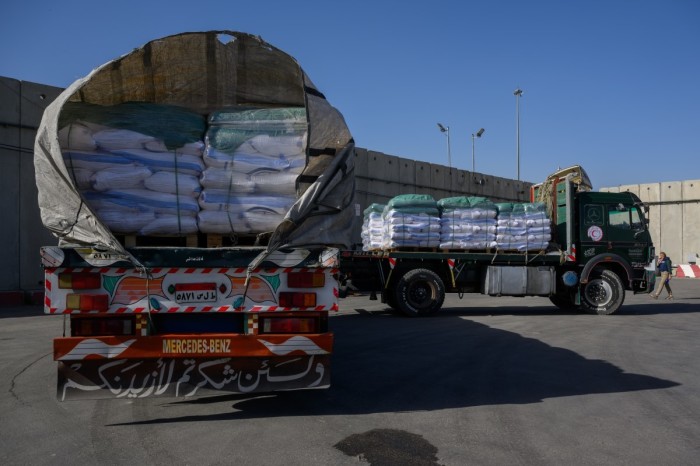Hamas stealing, selling Gaza aid on black market, Israeli official claims

A senior Israeli defense official claims that international outcries about a food shortage in the Gaza Strip have been "exaggerated" and contends that Hamas is stealing the supplies Israel and other countries send and selling them for more than their worth.
An unnamed senior Israeli defense official told The Jerusalem Post during a briefing last week that "There is no hunger in Gaza."
The official accused Hamas of stealing supplies and selling them to civilians for "10 times more than what it's worth."
Israel launched an offensive in Gaza to eradicate Hamas, a terror group that has controlled the Gaza Strip since 2007, following the group's Oct. 7 surprise attack against civilians in southern Israel on Oct. 7. The attack resulted in the deaths of at least 1,200 people and the abduction of around 240 others. While the Hamas-run Gaza Health Ministry claims over 30,000 have been killed during the five months of the war, the lack of distinction between terrorists and civilians makes the data difficult to verify.
The United Nations said in February that more than a quarter of Gaza's 2.3 million people were "estimated to be facing catastrophic levels of deprivation and starvation," according to Reuters.
On Monday, the executive director of the U.N. World Food Program said during a news conference in Rome that a famine is imminent in northern Gaza if there is no "exponential" increase in humanitarian aid, CNN reports.
The Jerusalem Post reports that it spoke to a former senior Israeli defense official who said that Hamas controls 70% to 80% of the area. When Israel and the United States deliver aid to Gaza, according to the former senior defense official, criminal gangs and Hamas often steal the supplies at gunpoint.
"There is no food shortage in Gaza; there are those who are hungry since Hamas has taken all of the food, and they don't have enough money to pay Hamas on the black market," the official stated.
"[The situation] in Gaza is akin to hunger in New York, where homeless people suffer not from a lack of food but from a lack of money to purchase it," he added.
The former official claimed that Hamas also prevents food drops, using shoulder-fired missiles to make it harder for countries like the U.S. to accurately drop supplies, which can result in the aid being lost to the sea. He argued that the terror group is deliberately preventing aid from reaching civilians to promote the narrative that Gazans are starving "as a consequence of external forces and legitimizing their control."
A third senior defense official told The Jerusalem Post about other terror groups aside from Hamas, including Hezbollah and the Houthis in Yemen, which he noted are connected to Iran. The official said that Israel has been working to eliminate Iran's proxies, and he wondered why countries in the West have not done the same.
"The Americans should also be actively eliminating Hamas proxies because it is in their interest," the official said. "Unfortunately, and although we have tried to convince them to do so, they haven't yet understood the importance – not only from an Israeli perspective, but actually from their own."
The World Food Program has reported that its aid convoys have faced delays, checkpoints, violence and looting of food. In February, the World Food Program suspended all deliveries to northern Gaza until conditions are in place to make delivering the aid more secure.
The World Food Program initially suspended deliveries for three weeks over safety concerns following an attack on an aid truck. The agency was to resume deliveries on Feb. 18 and was going to send 10 trucks of food for seven straight days.
"On [Feb. 18], as WFP started the route towards Gaza City, the convoy was surrounded by crowds of hungry people close to the Wadi Gaza checkpoint. First fending off multiple attempts by people trying to climb aboard our trucks, then facing gunfire once we entered Gaza City, our team was able to distribute a small quantity of the food along the way," the World Food Program said in a statement.
"On [Feb. 19], the second convoy's journey north faced complete chaos and violence due to the collapse of civil order. Several trucks were looted between Khan Younes and Deir al Balah and a truck driver was beaten. The remaining flour was spontaneously distributed off the trucks in Gaza City amidst high tension and explosive anger."
Before the State of the Union address last week, a senior Biden administration official said during a background press call that Hamas is holding up negotiations for a six-week ceasefire deal by refusing to release a certain number of vulnerable hostages.
"The path to a ceasefire is straightforward. There could be at least a six-week ceasefire today if Hamas would agree to release a defined category of vulnerable hostages, including women, elderly, sick, and the wounded," the Biden official said. "That deal is on the table now and has been for more than the past week."
"It would bring immediate relief to the people of Gaza," the official continued. "It would also create the conditions needed to enable the urgent humanitarian work that must be done. The onus right now is on Hamas."
Samantha Kamman is a reporter for The Christian Post. She can be reached at: samantha.kamman@christianpost.com. Follow her on Twitter: @Samantha_Kamman




























